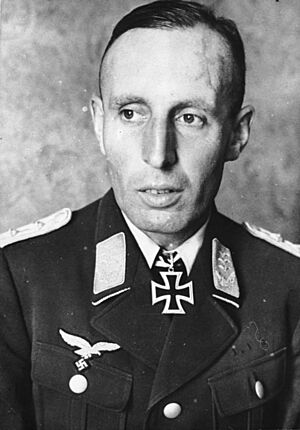Friedrich August Freiherr von der Heydte facts for kids
Quick facts for kids
Friedrich August Freiherr von der Heydte
|
|
|---|---|

Heydte in 1941
|
|
| Born | 30 March 1907 Munich, Kingdom of Bavaria, German Empire |
| Died | 7 July 1994 (aged 87) Aham, Landshut, Bavaria, Germany |
| Allegiance | |
| Service/ |
|
| Years of service | 1925–45, 1957–67 |
| Rank | Oberstleutnant (Fallschirmjager) Brigadegeneral (Bundeswehr) |
| Battles/wars | World War II |
| Awards | Knight's Cross of the Iron Cross with Oak Leaves |
Friedrich August von der Heydte (born March 30, 1907 – died July 7, 1994) was a German officer. He served as a paratrooper during World War II. After the war, he became a general in the army of West Germany. Besides his military career, Heydte was also a professor and a politician. He was a member of the Christian Social Union political party.
Early Life and Education
Friedrich August von der Heydte joined the German army, called the Reichswehr, in April 1925. He left the military for a short time in 1927. During this break, he studied at Innsbruck University and earned a degree in economics. He also received a law degree from Graz University.
In 1933, Heydte joined the NSDAP. He also became part of the Sturm Abteilung, a Nazi group. In 1935, he rejoined the Reichswehr and received special staff training. He also began a career in academics, studying international law.
Military Service in World War II
Heydte fought in the invasion of Poland and the Battle of France. In May 1940, he joined the Luftwaffe's parachute division. He led a battalion during the Battle of Crete in May 1941.
In July 1942, Heydte was sent to Libya. He commanded a special paratrooper battalion there. In February 1943, he moved to France. He helped create the new 2nd Fallschirmjäger Division.
After the fall of Sicily in 1943, Germany worried Italy might switch sides. So, Heydte's division moved to Rome in August. Heydte met Pope Pius XII during this time. His division helped Germany take control of Rome.
In January 1944, Heydte was given command of a regiment. His unit fought in the Battle of Carentan. They also took part in Operation Lüttich and battles during Operation Market Garden.
Operation Stösser: A Risky Paratrooper Drop
Before the Ardennes Offensive, Germany planned a secret mission called Operation Stösser. The goal was to drop paratroopers behind American lines. They wanted to capture a key crossroads near Malmédy. This would stop Allied supplies and reinforcements.
Heydte was chosen to lead this mission. He could not use his own experienced soldiers. Most of the paratroopers were new and had little training. The German air force used 112 transport planes. Many pilots were also inexperienced.
This was the only nighttime paratrooper drop for Germany in World War II. Many planes dropped soldiers in the wrong places. Some landed behind German lines, others far away. Only a few hundred landed near the target area. Some planes even landed with soldiers still inside.
The paratroopers were supposed to land 11 kilometers north of Malmédy. They needed to hold the crossroads for about 24 hours. Strong winds made the landings very difficult. Many inexperienced paratroopers were hurt when they landed. Heydte himself broke his arm during his jump.
Initially, only 125 men reached the correct landing zone. They had no heavy weapons. By the next day, Heydte had gathered about 300 troops. This force was too small to take the crossroads.
However, the scattered drops caused confusion for the Allies. They thought a much larger paratrooper force had landed. This made them send troops to secure their rear areas. This helped the main German attack at the front.
Heydte's radios were lost or broken. He didn't know that the main German attack had failed. His unit was cut off and had no supplies. American forces were also pursuing them. Heydte ordered his men to try and reach German lines. He surrendered on December 23, 1944. He was held as a prisoner of war in England until July 1947.
Life After the War
After being released as a prisoner of war, Heydte went back to his academic career. He finished his advanced degree in 1950. In 1951, he became a professor at the University of Mainz. He taught constitutional and international law. From 1954, he was a professor at the University of Würzburg. He also led the Institute for Military Law there.
Heydte also rejoined the military in West Germany. This new army was called the Bundeswehr. In 1962, he was promoted to Brigadier General in the Reserves. He retired in 1967, after 30 years of military service.
In 1947, Heydte joined the Christian Social Union (CSU) political party. He was active in the party's higher education group. From 1966 to 1970, he was a member of the Bavarian Parliament. He supported the Catholic Church's ideas of justice.
Death
Heydte passed away in Aham, Germany, in 1994. He had been ill for a long time.
Works
- Daedalus Returned (Hutchinson, 1958) - This book tells the story of the Battle of Crete.
- Der moderne Kleinkrieg als wehrpolitisches und militärisches Phänomen (Modern Irregular Warfare as a Phenomenon of Military Policy); Executive Intelligence Review, Nachrichtenagentur GmbH, Wiesbaden, Neuausgabe 1986 ISBN: 3-925725-03-2 (Erstausgabe: Holzner-Verlag, Würzburg 1972)
Awards and Honours
- Iron Cross (1939) 2nd Class (September 27, 1939) & 1st Class (September 26, 1940)
- German Cross in Gold on March 9, 1942
- Knight's Cross of the Iron Cross with Oak Leaves
- Knight's Cross on July 9, 1941
- Oak Leaves on September 30, 1944
- Bavarian Order of Merit (May 21, 1974)
- Grand Cross of Merit of the Federal Republic of Germany (March 17, 1987)
 | Aurelia Browder |
 | Nannie Helen Burroughs |
 | Michelle Alexander |

